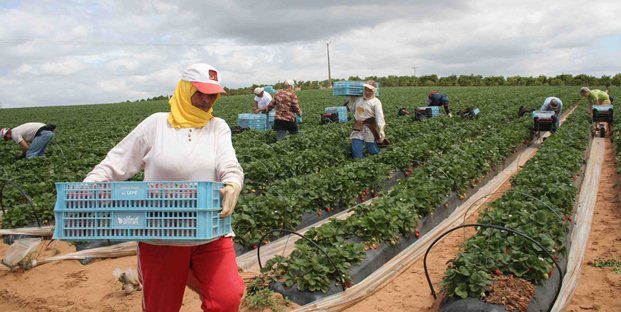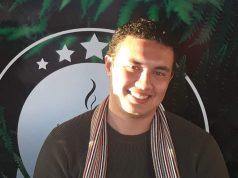[symple_box color=”blue” text_align=”left” width=”100%” float=”none”]  Maha Tazi is a graduate in International Relations and Middle Eastern Politics from the University of Wollongong in Dubai (UOWD). She is currently working as a Project Consultant in Public Relations and Corporate Communications at APCO Worldwide and teaching part-time as an adjunct instructor in Philosophy at UOWD. Maha has a special interest in world affairs and gender issues. She took a Women Studies course for one year at Sciences Po Paris and worked with several civil society organizations that struggle for the advancement of women’s rights including Association Solidarite Feminine (ASF) in Morocco. [/symple_box]
Maha Tazi is a graduate in International Relations and Middle Eastern Politics from the University of Wollongong in Dubai (UOWD). She is currently working as a Project Consultant in Public Relations and Corporate Communications at APCO Worldwide and teaching part-time as an adjunct instructor in Philosophy at UOWD. Maha has a special interest in world affairs and gender issues. She took a Women Studies course for one year at Sciences Po Paris and worked with several civil society organizations that struggle for the advancement of women’s rights including Association Solidarite Feminine (ASF) in Morocco. [/symple_box]

Dubai, UAE—Women in the Middle East are often portrayed as helpless ‘victims’ in need of foreign liberation while female advocacy in the region is also described as weak and particularly fragile. This view, I believe, is quite simplistic and reductionist and fails to capture the complexity of the social realities in the region as well as the specificities of each country and the extent to which women are able to mobilize and organize themselves today in order to promote effective and sustainable social change.
In fact, against the scenario of submissive and helpless women, there is a strong female agency that is emerging in the Middle East today, breaking down all the stereotypes by challenging this dominant view and the long-dated discrimination against women in the region. Women in the Middle East are not passive secondary citizens but active agents of social change.
Several studies have identified multiple factors restricting women’s agency in the Middle East: Cases in point, the World Bank 2013 Report points out at the role of the traditional gender norms and the legal framework in the reproduction of the inequalities against women (WB, 2013). In the WB Report, women’s agency was also defined as: “the capacity and authority to act, and underpins an individual’s ability to shape her own life: freedom of choice, expression, and decision making” (World Bank, 2013). Therefore, according to the findings, the traditional gender archetype promoting the traditional gender roles and a sexual division of labor as well as the ongoing discrimination against women deeply entrenched in the law significantly undermine Middle Eastern women’s capacity to act and effectively shape their own life today. On the other hand, Valentine Moghadam identifies women’s underrepresentation in the economic and political domains and the discriminatory family laws as the main factors behind the recurrent low social status of women and the limited chances for women’s agency. She explains how these very economic and political issues are also at the heart of contentious politics involving women’s rights groups and governments in region today (Moghadam, 2010). In other words, because women are mainly discriminated against on the economic and political level, their claims primarily focus on equal access and representation in the public sphere.
However, as many scholars pointed out, women’s advocacy in the region is in reality quite active in spite of the deeply rooted challenges and discrimination in these societies’ historical and cultural norms. In fact, in ‘Women, Structure, and Agency in the Middle East’, Valentine Moghadam argues that: “Despite these travails, and to a certain extent because of them, women in the Middle East and North Africa have developed strategies for survival and empowerment and have evolved in ways that shatter every stereotype that has represented them as victimized, passive, and traditional” (Moghadam 2010).
One example of the growing female agency in the region is the Ananke project. An online publication, Ananke is a non-profit initiative by Sabin Muzaffar, an experienced journalist and media-person who staunchly believes in using technology to engage in meaningful debates on human rights, women issues as well as gender mainstreaming, thereby creating social impact. As a project, Ananke encompasses an online magazine focusing on issues of women’s rights across the Middle East region and beyond; the website also shed lights on inspiring women figures and women who have built a name for themselves in the region either through female advocacy or feminine leadership. Unlike many women-centric virtual platforms, Ananke strives to trigger debates that are participatory; therefore providing all inclusive, positive outcomes and expositions.
Launched in December 2nd, 2014, Ananke is the only online publication in the Middle East today that not only celebrates visionary women across the region and beyond, but also instigates discussions on issues pertaining to gender equality, women in STEM, women entrepreneurship, as well as topics including education and women in crisis, gender violence and poverty. The eZine includes in-depth analyses and research articles on issues relating to the female gender, their rights and the discrimination they face on a daily basis by focusing on women’s s achievements and how they contribute to their communities as well as to the overall economic activity of a country.
In fact, as exemplified by Ananke, women in the Middle East are building strong female organizations to voice their concerns and advance their causes such as Association Solidarite Feminine (ASF) which struggles for the rights of Single Mothers in Morocco and which was also featured in one of the interviews I conducted for Ananke. Other leading associations also include: Women’s Organization of Iran and the Aurat Foundation in Pakistan (AF): Established in 1986 as a national, non-profit, non-governmental organization the Aurat Foundation has come to be recognized nationally and internationally as one of the leading institutions creating, facilitating and strengthening civil society groups and networks for promoting trust and collaboration among citizens to mobilize public pressure for women’s empowerment in the country.
Additionally, women in the region are conducting significant research and expanding the scope of knowledge available in the fields of Women and Feminist Studies through the role of prominent scholars from the Middle East or of Middle Eastern origin working at leading universities today; to cite only a few: Leila Ahmed, Fatima Mernissi, Lila Abu Lughod and Valentime Moghadam are definitely inspiring feminist figures. Women are also demanding equal citizenship, and are networking internationally to this end. Therefore, as Valentine Moghadam pertinently pointed out: “In the process, women are changing the nature of the public sphere and helping to build civil society in their countries; and they are helping to shift the balance of feminist power—in terms of conceptual and strategic innovations—from North to South” (Moghadam, 2010).
In fact, feminist scholars have highlighted three milestone events representing major progresses in the fields of women’s rights and gender equality which also reflect the strong emerging female agency in the region: First, the 2003-2004 reform of Morocco’s personal status code -the Mudawanna- which granted Moroccan women several rights ranging from family to civic and legal rights. Second, the 2004 Arab League Summit held in Tunis which called to “consider the promotion of the rights of Arab women as a fundamental axis of the process of development and modernization of Arab societies” (Labidi, 2007). And finally, the emergence of a vocal and visible feminist movement in Iran in 2005 through campaigns such as Stop Stoning Forever and the One Million Signatures Campaign for Equality and Legal Reform, along with the massive participation of women in the Green Protests of the summer of 2009.
Therefore, the 2013 World Bank Report emphasizes that equality under the law and its enforcement are critical for women’s agency, focusing on the role of the law in institutionalizing social norms and triggering sustainable change as it was highlighted that: “Family and personal laws not only impact a woman’s role within her family but also can determine her access to property and her ability to function independently. Labor and pension laws also can limit women’s options” (WB, 2013).
Clearly, the Middle East is not a region that is unchanging, nor is it one in which women are simply victims of oppression and bystanders to events. Feminist scholars and women activists in the region are undeniably making a difference today. In fact, as Sabin Muzaffar, Ananke’s founder raised: “Writing is a great tool for making a difference. It is indeed mightier than the sword and with the power of online media, is poised to create a stir in the world we live in today”.







